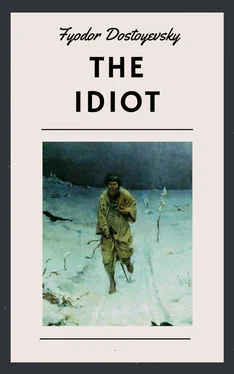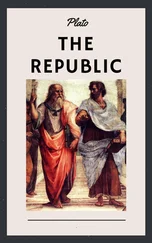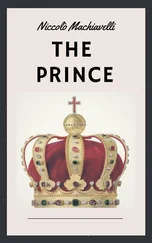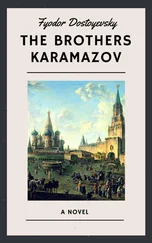“I tell you, sir, he wished it himself!”
At this moment the study door opened, and a military man, with a portfolio under his arm, came out talking loudly, and after bidding good-bye to someone inside, took his departure.
“You there, Gania?” cried a voice from the study, “come in here, will you?”
Gavrila Ardalionovitch nodded to the prince and entered the room hastily.
A couple of minutes later the door opened again and the affable voice of Gania cried:
“Come in please, prince!”
General Ivan Fedorovitch Epanchin was standing in the middle of the room, and gazed with great curiosity at the prince as he entered. He even advanced a couple of steps to meet him.
The prince came forward and introduced himself.
“Quite so,” replied the general, “and what can I do for you?”
“Oh, I have no special business; my principal object was to make your acquaintance. I should not like to disturb you. I do not know your times and arrangements here, you see, but I have only just arrived. I came straight from the station. I am come direct from Switzerland.”
The general very nearly smiled, but thought better of it and kept his smile back. Then he reflected, blinked his eyes, stared at his guest once more from head to foot; then abruptly motioned him to a chair, sat down himself, and waited with some impatience for the prince to speak.
Gania stood at his table in the far corner of the room, turning over papers.
“I have not much time for making acquaintances, as a rule,” said the general, “but as, of course, you have your object in coming, I—”
“I felt sure you would think I had some object in view when I resolved to pay you this visit,” the prince interrupted; “but I give you my word, beyond the pleasure of making your acquaintance I had no personal object whatever.”
“The pleasure is, of course, mutual; but life is not all pleasure, as you are aware. There is such a thing as business, and I really do not see what possible reason there can be, or what we have in common to—”
“Oh, there is no reason, of course, and I suppose there is nothing in common between us, or very little; for if I am Prince Muishkin, and your wife happens to be a member of my house, that can hardly be called a ‘reason.’ I quite understand that. And yet that was my whole motive for coming. You see I have not been in Russia for four years, and knew very little about anything when I left. I had been very ill for a long time, and I feel now the need of a few good friends. In fact, I have a certain question upon which I much need advice, and do not know whom to go to for it. I thought of your family when I was passing through Berlin. ‘They are almost relations,’ I said to myself, ‘so I’ll begin with them; perhaps we may get on with each other, I with them and they with me, if they are kind people;’ and I have heard that you are very kind people!”
“Oh, thank you, thank you, I’m sure,” replied the general, considerably taken aback. “May I ask where you have taken up your quarters?”
“Nowhere, as yet.”
“What, straight from the station to my house? And how about your luggage?”
“I only had a small bundle, containing linen, with me, nothing more. I can carry it in my hand, easily. There will be plenty of time to take a room in some hotel by the evening.”
“Oh, then you do intend to take a room?”
“Of course.”
“To judge from your words, you came straight to my house with the intention of staying there.”
“That could only have been on your invitation. I confess, however, that I should not have stayed here even if you had invited me, not for any particular reason, but because it is—well, contrary to my practice and nature, somehow.”
“Oh, indeed! Then it is perhaps as well that I neither did invite you, nor do invite you now. Excuse me, prince, but we had better make this matter clear, once for all. We have just agreed that with regard to our relationship there is not much to be said, though, of course, it would have been very delightful to us to feel that such relationship did actually exist; therefore, perhaps—”
“Therefore, perhaps I had better get up and go away?” said the prince, laughing merrily as he rose from his place; just as merrily as though the circumstances were by no means strained or difficult. “And I give you my word, general, that though I know nothing whatever of manners and customs of society, and how people live and all that, yet I felt quite sure that this visit of mine would end exactly as it has ended now. Oh, well, I suppose it’s all right; especially as my letter was not answered. Well, good-bye, and forgive me for having disturbed you!”
The prince’s expression was so good-natured at this moment, and so entirely free from even a suspicion of unpleasant feeling was the smile with which he looked at the general as he spoke, that the latter suddenly paused, and appeared to gaze at his guest from quite a new point of view, all in an instant.
“Do you know, prince,” he said, in quite a different tone, “I do not know you at all, yet, and after all, Elizabetha Prokofievna would very likely be pleased to have a peep at a man of her own name. Wait a little, if you don’t mind, and if you have time to spare?”
“Oh, I assure you I’ve lots of time, my time is entirely my own!” And the prince immediately replaced his soft, round hat on the table. “I confess, I thought Elizabetha Prokofievna would very likely remember that I had written her a letter. Just now your servant—outside there—was dreadfully suspicious that I had come to beg of you. I noticed that! Probably he has very strict instructions on that score; but I assure you I did not come to beg. I came to make some friends. But I am rather bothered at having disturbed you; that’s all I care about.—”
“Look here, prince,” said the general, with a cordial smile, “if you really are the sort of man you appear to be, it may be a source of great pleasure to us to make your better acquaintance; but, you see, I am a very busy man, and have to be perpetually sitting here and signing papers, or off to see his excellency, or to my department, or somewhere; so that though I should be glad to see more of people, nice people—you see, I—however, I am sure you are so well brought up that you will see at once, and—but how old are you, prince?”
“Twenty-six.”
“No? I thought you very much younger.”
“Yes, they say I have a ‘young’ face. As to disturbing you I shall soon learn to avoid doing that, for I hate disturbing people. Besides, you and I are so differently constituted, I should think, that there must be very little in common between us. Not that I will ever believe there is nothing in common between any two people, as some declare is the case. I am sure people make a great mistake in sorting each other into groups, by appearances; but I am boring you, I see, you—”
“Just two words: have you any means at all? Or perhaps you may be intending to undertake some sort of employment? Excuse my questioning you, but—”
“Oh, my dear sir, I esteem and understand your kindness in putting the question. No; at present I have no means whatever, and no employment either, but I hope to find some. I was living on other people abroad. Schneider, the professor who treated me and taught me, too, in Switzerland, gave me just enough money for my journey, so that now I have but a few copecks left. There certainly is one question upon which I am anxious to have advice, but—”
“Tell me, how do you intend to live now, and what are your plans?” interrupted the general.
“I wish to work, somehow or other.”
“Oh yes, but then, you see, you are a philosopher. Have you any talents, or ability in any direction—that is, any that would bring in money and bread? Excuse me again—”
Читать дальше












